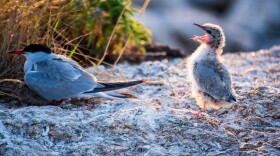Scientists have narrowed down the top likely cause of more than 1,400 seal deaths across New England in recent months.
But they say the "unusual mortality event" appears to be ending as cold weather sets in.
The National Oceanic and Atmospheric Administration says the main pathogen found in the stranded seals was phocine distemper virus.
It commonly affects seals and could affect pets, but can't be transferred to humans.
NOAA says the peak months of the die-off were August and September. In total, they say more than 1,000 seals stranded and died in Maine since July, plus more than 300 others in Massachusetts and New Hampshire.
But now, Seacoast Science Center rescue manager Ashley Stokes says the virus seems to have run its course.
"As the temperature drops, the virus can't duplicate as quickly, so it can't spread as quickly,” Stokes says.
She notes that warmer temperatures, likely to occur more frequently in New England with climate change, can help viruses and parasites multiply and spread more quickly.
In late November, she says the Science Center tested a dead harp seal for distemper at the University of New Hampshire's Veterinary Diagnostic Lab.

It’s the Science Center's new, local back-up lab for necropsies, with their primary facility – the New England Aquarium’s lab in Quincy – often at capacity.
Harp seals visit New England seasonally, and NOAA says some have been found dead with phocine distemper this season.
But Stokes says their recently necropsied harp seal, a juvenile male found in Rye, did not test positive for the virus.
In future, she says the new partnership with UNH could have educational benefits, and will help them conduct more necropsies of protected marine mammals year-round.
“If there's something we can do to prevent it or if we start to see a trend, it just helps show us what's going on in the grand scheme of those animals rather than just simply taking measurements and disposing of them,” Stokes says.
The lab can also help necropsy dolphins, porpoises, other kinds of seals and some small whales. Larger whale species must be necropsied on the beach where they were found.
Stokes says residents should remember not to approach stranded or deceased marine mammals if they spot one on an area beach. Instead, they can call the Science Center's rescue hotline at (603) 997-9448.








